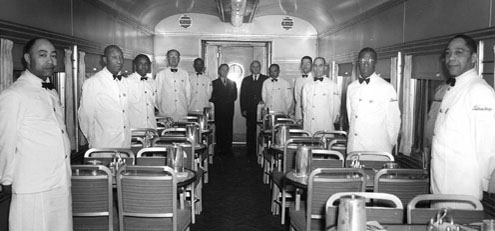Reflections
on
Black
History
______Part 41 |
Joining the Union
by Thomas C. Fleming, Jul 1, 1998
In the early 1900s, travel for the general public -- that is, the white public -- was an ever-expanding business, with more services on the rail lines, the coastwise passenger ships and even the passenger-carrying river steamboats.
Almost all travel was done by rail or water. The buses were just entering the long-distance hauls when I went to work as a fourth cook for the Southern Pacific Railroad in 1927. You didn't have freeways then; most of the highways were two lanes. There were no passenger planes, and very few airplanes were even carrying mail.
Organized labor in the early years of this century was never friendly about blacks becoming members. Most trade unions were as hostile towards blacks entering the job market as were the employers.
The steward on the train, who ordered all of the supplies and was the foreman of the whole crew on the dining car, was always a white man. The rest of the dining crew were almost always black men. Unions were not popular among black workers, many of whom viewed them as outright racist.
Southern Pacific "Daylight" dining car crew, 1945. (l. to r.): Waiters McKinley Greene, Louis Mickens, Fred L. Wilson, Fred Thornton and Reeves Johnson; Andrew Bachmat, inspector of dining cars; Steward John Henderson; and waiters Courtney Reece, William H. Simpkins, Sidney E. Addison, J.P. Olds and Walter White.

Fred Turner, the chef in the first dining car where I worked, was a rabid union man. He was one of the founders of the Dining Car Cooks and Waiters Union, which had just gained recognition from the Southern Pacific as a trade union. It was all blacks who organized it. But no union meant very much unless it got a charter from the American Federation of Labor, which had a lily-white policy.
The Bartenders Union had solved the problem by declaring the black railway employees as an auxiliary of the Bartenders. We paid dues and engaged in limited bargaining with the company, but we had none of the voting rights that all trade unions had by being members of the international.
The pay went from $150 a month for chefs to $60 a month for the dishwasher or fourth cook. Waiters probably earned less than $80 a month. Before the cooks and waiters unionized, there was no hourly wage scale; they worked 12 or 14 hours a day.
The union got the black workers a contract for an eight-hour day and overtime pay for those extra hours, plus a nice retirement pension. It served to prove to those segregated workers that the trade union movement was a necessity for all workers.
We generally started work at 5:30 in the morning, and worked probably until 9 at night. They paid us overtime, but not time and a half. We were on our feet all day. If there were still people in the dining room, the waiters could sit down at the table, but we had to stay back in the kitchen because we were dressed in cooks' clothes.
Despite the gains made through unionization, many of the black workers did not join, because applicants did not need to be union members in order to get a job.
Fred Turner hated those nonunion people, and did not hesitate to let them know of his scorn. Most of his dislike was against the Pullman porters who did not join the Brotherhood of Sleeping Car Porters, and against waiters on the dining cars.
He blasted them because they received the bulk of their pay in the form of tips from the people they served. In Turner's opinion, such persons were not independent like he was, and had to perform in a more servile manner towards the public. The union found more resistance among the waiters than the cooks. He contemptuously called the waiters "scab niggers." This did not affect them any, for most of them felt that the union could do nothing for them, as they would be hired anyway when the company needed help.
Fred took me by the union office, which was on 7th Street in Oakland, on the same block as the Sleeping Car Porters. I joined the union then, and remained a paying member as long as I worked on the railway. I was violently opposed to any form of racism, and I quickly saw that it was to my advantage to join.
The Cooks and Waiters Union was not a national organization like the porters'. Perhaps some crew members from the Western Pacific and the Santa Fe joined, but it was largely employees of the Southern Pacific.
William McFarlane was executive director of the Cooks and Waiters Union for the San Francisco Bay Area. He had a staff of one, Mattie Thomas, who did all of the clerical work in the tiny office.
For the Los Angeles area, the union's director was Clarence Johnson. He was the uncle of Byron Rumford, who in 1949 would become the first black elected to the state legislature in Northern California. In 1963, Assemblyman Rumford would author the state's first law prohibiting racial discrimination in housing, known as the Rumford Act.
Copyright © 1998 by Thomas Fleming. Email.
At 90, Fleming continues to write each week for the Sun-Reporter, San Francisco's African American weekly, which he co-founded in 1944. A 48-page book of his stories and photos from 1907-19 is available for $3, including postage, and a 90-minute cassette tape of his recollections of black life in Florida, Harlem and Chico from 1912-1926 is available for $5, including postage. Send mailing address or call 415-771-6279.
Fleming Biography
More Fleming articles
Back to Front Page
|

